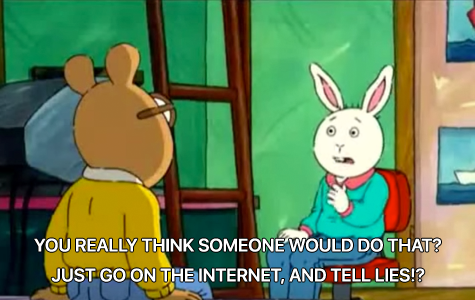Michael Spehar

source: Medium.com, Medium, 17 May 2016, www.medium.com/unboxd/lying-and-online-buying-7f866e149888.
When inevitably lectured on the “unreliability and unacceptability” of using Wikipedia as a source, the less-savvy student may well roll their eyes and use Wikipedia in the way that many already do: to gain a preliminary bedrock of understanding from which to seek other official sources and construct a paper of proper university acumen. But the savvy of the 2018-19 English 204 at the U of S surely knows better: to question the implications of such a centralized, ubiquitous hub for the world’s knowledge. If Wikipedia serves at that previously-mentioned bedrock of understanding, what un-fortuitous conclusions might be reached if such a foundation was fallacious? Spurious? Biased in the extreme, or claiming authority from editors either maliciously motivated, or merely mischievous? What follows are several such examples of less-than-altruistic tampering with the integrity of Wikipedia as an encyclopedia, driven by either malicious, capricious, or perhaps even humorous.
Our first example is especially relevant in the modern discourse. On September 27th, 2018, during the extensively publicised hearing of Brett Kavanaugh, Wikipedia would be used as a tool to doxing multiple members on the Senate Judiciary Committee sympathetic to Kavanaugh’s allegations and position. Personal information including addresses and phone numbers was added to the Wikipedia pages for Linsday Graham, Mike Lee, and Orin Hatch by a “troll (or trolls),” (Cameron, Gizmodo). While the personal information of the targeted senators was only made public for a short time, it was enough for a twitter-bot to screencap and spread the information beyond just Wikipedia.
Beyond doxing, Wikipedia was also used by numerous American politicians throughout 2006 to whitewash their own public images by having their pages edited. In particular, staff members of Representative Marty Meehan’s own office had, with permission from Meehan himself and on government computers, edited the Wikipedia biography for Meehan to appear in a more favorable light: removing negative references to his career, broken campaign promises, and the size of his campaign funds, (Anderson, Ars Technica). This is only one salient example to elucidate a trend that, while largely reported throughout 2006, seems unlikely to be limited to that single year.
The editing of an individual’s personal page to the positive or negative effect of the subject’s public image is one thing, but what of a larger entity, such as a corporation or a church? Or perhaps (though perhaps churlish and uncharitable to say), both, in the case of Scientology.
The saga of Scientology and Wikipedia is a lengthily one, marked by ping-pong edit wars, threats of legislation, and the invocation of freedom of speech being parried by accusations of propaganda and misinformation. Beginning in 2007 with the advent of WikiScanner revealing a campaign of tampering by the Church of Scientology, and concluding a year later with an arbitration committee blocking all IP addresses associated with the CoS (with a distracting interlude by a 4Chan gang dubbed “Project Chanology”), the whole messy situation is a salient example of Wikipedia used as a propaganda tool, and the dangerous of user-edited content, (Moore, The Telegraph).
Finally, what of the editors themselves? The lauded “experts” on a particular field? Or indeed a multitude of fields. How many of us have found ourselves in a spirited online debate suddenly confronted with the chest-thumping admonition “What do you know? I have two degrees and 15 years of experience in this field, and I’m not about to be talked down to by some-” etcetera etcetera. Well, predictably, one such case of a decorated expert was exposed in a manner both spectacular and hilarious. User, administrator, and self-appointed arbitrator Essjay was a frequent poster and editor of numerous Wikipedia pages, and was a salaried member of Wikipedia’s staff. Claiming doctoral degrees in theology and canon law, in addition to holding a tenured professorship, the user was ultimately revealed to be nothing of the sort: just a 24 year old named (supposedly) Ryan Jordan with absolutely no advanced degrees. Essjay would be lauded by Jimmy Wales and even participate in an interview with The New Yorker, and when his false persona was revealed, forced the New Yorker into the uncomfortable position of printing a retraction regarding the qualifications of Essjay. (Moore, The New York Times). The simple fact that this kid was able to hoodwink all these people for so long does not imply Essjay was a master of manipulation worthy of the highest thespians or con-artists, but rather a cautionary tale of appeals to truth by authority, and the grim realization that there are likely many others like him suffusing Wikipedia and the internet at large.
Where does this leave us? Condemning an entire platform due to the misuse of a few seems rash, especially considering the position Wikipedia occupies in modern education, both institutional and autodidactal. But to ignore the potential (and demonstrable) misuse of Wikipedia seems not only imprudent, but in the case of political whitewashing and falsified professional credentials, dangerously negligent. Hence, once must treat Wikipedia like any other well: perhaps poisoned, perhaps not. Vigilance seems the most practical solution available to the average user: familiarization with the practices of page-editing, seeking discussion threads on edits, and following up all sources listed per-page. Rare is the person capable of discerning bias or manipulation of an article at a glance. More reasonable is cultivating an awareness of tone, and a general sense of skepticism of any “anyone-can-edit” platform. Cynical? Perhaps. Practical? Unquestionably.
Works Cited:
Anderson, Nate. “Congressional Staffers Edit Boss’s Bio on Wikipedia.” Ars Technica, Ars Technica, 30 Jan. 2006, www.arstechnica.com/uncategorized/2006/01/6079-2/
Cameron, Dell. “Republican Senators Doxed While Interviewing Kavanaugh.” Gizmodo, Gizmodo, 28 Sept. 2018, www.gizmodo.com/republican-senators-doxed-while-interviewing-kavanaugh-1829376044.
Cohen, Noam. “After False Claim, Wikipedia to Check Degrees.” The New York Times, The New York Times, 12 Mar. 2007, www.nytimes.com/2007/03/12/technology/12wiki.html?ex=1331352000&en=668e67bce73bf6c6&ei=5089&partner=rssyahoo&emc=rss.
“Just Go on the Internet and Tell Lies meme.” Medium.com, Medium, 17 May 2016, www.medium.com/unboxd/lying-and-online-buying-7f866e149888.
Moore, Matthew. “Church of Scientology Members Banned from Editing Wikipedia.” The Telegraph, Telegraph Media Group, 30 May 2009, www.telegraph.co.uk/technology/wikipedia/5408761/Church-of-Scientology-members-banned-from-editing-Wikipedia.html.